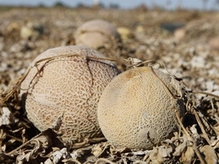
Proposed Friday, they will make the food Americans eat safer and help prevent food-borne diseases that every year kill about 3,000 people and sicken at least 2 million others.
It will still be another three years before the rules are implemented at the biggest farms and even longer at smaller farms. The new rules could cost large farms $30,000 a year, according to the FDA. The federal agency did not break down costs for individual processing plants, but said the rules could cost manufacturers up to $475 million annually.
The new rules come exactly two years to the day President Obama's signed food safety legislation passed by Congress, But their administration delayed enactment until after the election. The 2011 law required the FDA propose a first installment of the rules a year ago and food safety advocates sued the administration to expedite the process.
This marks the first time the FDA has had real authority to regulate food on farms. In an effort to stave off protests from farmers, the rules apply only to certain fruits and vegetables that pose the greatest risk, like berries, melons, leafy greens and other foods that are usually eaten raw. Rules for a farm that produces green beans that will be canned and cooked will not change.
Those types of exceptions along with the realization that outbreaks are bad for business have brought the produce industry and much of the rest of the food industry on board as Congress and FDA work to make food safer.
The most sweeping food-safety guidelines in decades will require farmers to take new precautions against contamination, to include making sure workers' hands are washed, irrigation water is clean, and that animals stay out of fields. Food manufacturers will have to submit food safety plans to the government to show they are keeping their operations clean.
Many food companies and farmers already follow the steps the FDA will require. But officials and food safety advocates say implementing the rules earlier could have saved lives and prevented illnesses in several of the large-scale outbreaks that have hit the country in recent years.
FDA Commissioner Margaret Hamburg said the rules' success depend on how much money Congress gives the chronically underfunded agency. "Resources remain an ongoing concern," she said.
The farm and manufacturing rules are only one part of the food safety law. The bill also authorized more surprise inspections by the FDA and gave the agency additional powers to shut down food facilities. In addition, the law requires stricter standards on imported foods. The agency said it will soon propose other overdue rules to ensure that importers verify overseas food is safe and to improve food safety audits overseas.
"The new law should transform the FDA from an agency that tracks down outbreaks after the fact, to an agency focused on preventing food contamination in the first place," said Caroline Smith DeWaal of the Center for Science in the Public Interest.
In a peanut butter outbreak this year linked to 42 salmonella illnesses, inspectors found samples of salmonella throughout Sunland.'s peanut processing plant in New Mexico and multiple obvious safety problems, such as birds flying over uncovered trailers of peanuts and employees not washing their hands.
Outbreaks of listeria in cheese and salmonella in peanut butter, mangoes and cantaloupe were linked to more than 400 illnesses and as many as seven deaths just since last summer, according to the federal Centers for Disease Control and Prevention. The actual number of those sickened is likely much higher.
In a 2011 outbreak of listeria in cantaloupe that claimed 33 lives, FDA inspectors found pools of dirty water on the floor and old, dirty processing equipment at Jensen Farms in Colorado where the cantaloupes were grown.
When the rules are implemented, companies will have to lay out illness-prevention plans, monitor their own progress and explain to the FDA how they would correct them.
"The rules go very directly to preventing the types of outbreaks we have seen," said Michael Taylor, FDA's deputy commissioner for foods.
Pamela Bailey, president of the Grocery Manufacturers Association, which represents the country's biggest food companies, said in a statement Friday that the food safety law "can serve as a role model for what can be achieved when the private and public sectors work together to achieve a common goal."





